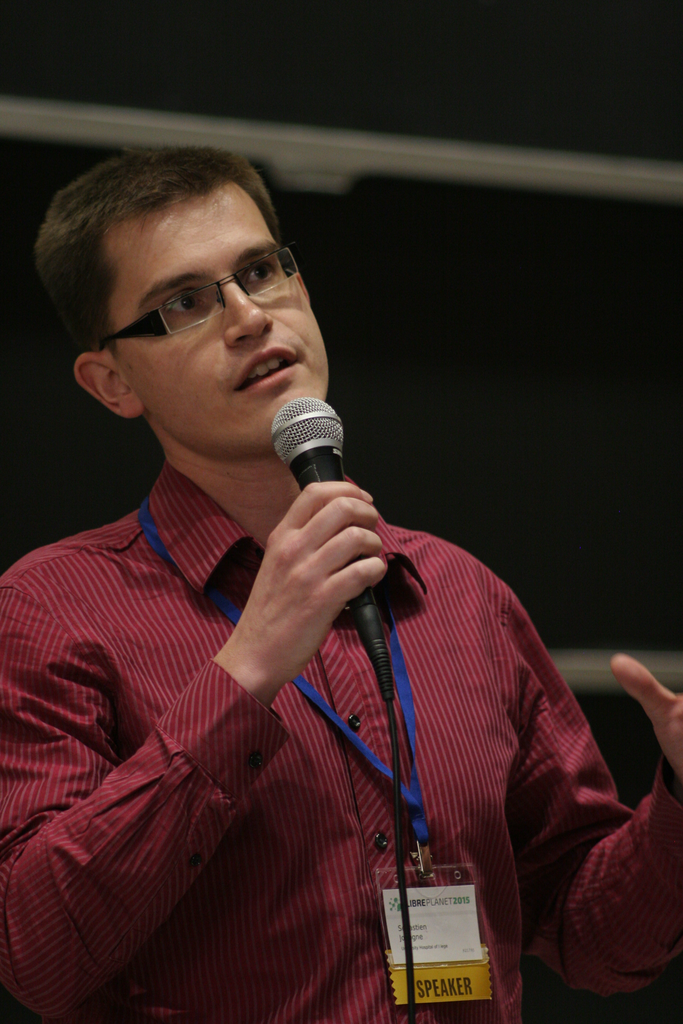Who is improving the world through free software? Nominate them now
jeudi 10 septembre 2015 à 23:10Nominations for the 18th annual Free Software Awards opened at LibrePlanet 2015, right after the most recent Free Software Awards were presented -- and we need you to nominate more projects by November 1st, 2015 at 23:59 UTC. To nominate an individual for the Award for the Advancement of Free Software or a project for the Award for Projects of Social Benefit, send your nomination along with a description of the project or individual to award-nominations@gnu.org.
If you know a free software contributor or project that deserves celebration, don't hesitate to nominate them! This is your opportunity to publicly recognize people and projects that have inspired you. Your nominations will be reviewed by our awards committee and the winners will be announced at LibrePlanet 2016.
Award for the Advancement of Free Software
The Free Software Foundation Award for the Advancement of Free Software is presented annually by FSF president Richard Stallman to an individual who has made a great contribution to the progress and development of free software, through activities that accord with the spirit of free software.
Last year, Sébastien Jodogne was recognized with the Award for the Advancement of Free Software for his work on free software medical imaging with his project Orthanc
Award for Projects of Social Benefit

The Award for Projects of Social Benefit is presented to the project or team responsible for applying free software, or the ideas of the free software movement, in a project that intentionally and significantly benefits society in other aspects of life.
We look to recognize projects or teams that encourage people to cooperate in freedom to accomplish tasks of great social benefit, and those that apply free software ideas and lessons outside the free software community. A long-term commitment to one's project (or the potential for a long-term commitment) is crucial to this end.
This award stresses the use of free software in the service of humanity. We have deliberately chosen this broad criterion so that many different areas of activity can be considered. However, one area that is not included is that of free software itself. Projects with a primary goal of promoting or advancing free software are not eligible for this award (we honor individuals working on those projects with our annual Award for the Advancement of Free Software).
We will consider any project or team that uses free software or its philosophy to address a goal important to society. To qualify, a project must use free software, produce free documentation, or use the idea of free software as defined in the Free Software Definition. Projects that promote or depend on the use of non-free software are not eligible for this award. Commercial projects are not excluded, but commercial success is not our scale for judging projects.
Last year, Reglue received the award, in recognition of its work giving GNU/Linux computers to underprivileged children and their families in Austin, TX.
Eligibility
In the case of both awards, previous winners are not eligible for nomination, but renomination of other previous nominees is encouraged. Only individuals are eligible for nomination for the Advancement of Free Software Award (not projects), and only projects can be nominated for the Social Benefit Award (not individuals). For a list of previous winners, please visit https://www.fsf.org/awards.
Current FSF staff and board members, as well as award committee members, are not eligible.
The tentative award committee members are: Hong Feng, Marina Zhurakhinskaya, Yukihiro Matsumoto, Suresh Ramasubramanian, Fernanda Weiden, Matthew Garrett, Jonas Öberg, Wietse Venema, Vernor Vinge, Rob Savoy, Harald Welte, and Andrew Tridgell.
Instructions
After reviewing the eligibility rules above, please send your nominations to award-nominations@gnu.org, on or before Sunday, November 1st, 2015 at 23:59 UTC. Please submit nominations in the following format:
-
In the email message subject line, either put the name of the person you are nominating for the Award for Advancement of Free Software, or put the name of the project for the Award for Projects of Social Benefit.
-
Please include, in the body of your message, an explanation (forty lines or less) of the work done and why you think it is especially important to the advancement of software freedom or how it benefits society, respectively.
-
Please state, in the body of your message, where to find the materials (e.g., software, manuals, or writing) which your nomination is based on.
Attend the Free Software Awards at LibrePlanet 2016
Want to be in the room when the winners are announced? Registration will open soon for the LibrePlanet conference, March 19-20 2016, in Cambridge, MA. You can meet the award winners and take part in a program devoted to the world of free software. Remember: Free Software Foundation members attend LibrePlanet gratis!